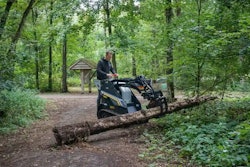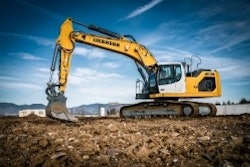Wheel loaders in the 150-to-200-horsepower range are the jobsite gofers – go for this, go for that. Jobs abound for this size of wheel loader, many of which now have standard features that were options a short time ago. In fact, the lists of options for new models get shorter with each redesign.
From custom to customary
Nick Tullo, Volvo’s North American communicator and specialist, articulated haulers and wheel loaders, says features that were add-ons to earlier wheel loader models are now standard because 1.) it’s often more economical to build upgrades into the base model and 2.) the advanced features are frequently integrated into other systems. For example, Tullo says Volvo’s electro-hydraulic controls offer infinitely variable settings for boom and bucket angles and includes a return-to-dig function that was a separate option when hydraulic servo controls were used. Alan Pumklin, Cat’s wheel loader market development engineer, says consolidating features also simplifies loader operations. Gary Bell, vice president of Kawasaki Construction Machinery, adds that specific environments or applications often require an entire set of specialized options available in package form.
While today’s midsize wheel loaders are ready to hit the ground rolling, there are options to consider depending on your work, your operators and how long you plan to keep your machine. Mike Gidsaspow, Komatsu’s wheel loader market manager, says some features may make the machine a more attractive resale – even if it’s an item you might not use frequently. “Ride control and auto-reversing fans are standard on many Komatsu machines because of high demand from our customers. These options don’t impede the performance on your machine. If you don’t want to use the ride control, just turn it off and you don’t need to worry about it.”
Options to consider
Fatigue is a huge drain on operator productivity. Tullo says the goal is to keep the operator comfortable so that the afternoon’s production rate is the same as in the morning. Tilt steering columns, infinitely adjustable seats, arm rests and controls placement options support the operator’s production style. When these are combined with an optional noise suppression package and air conditioning system operators can comfortably concentrate on the job at hand.
Hydraulic ride controls increase operator production and material retention by keeping the load stable and let the operator focus on driving. Quick couplers and auxiliary hydraulics systems save your operator’s time and allow the loader to use more power-hungry attachments such as power brooms.
Bryan Evans, product support manager at Doosan, says that 90 percent of resale value is determined by how well the machine has been maintained. Automatic hydraulic reversible fans are standard on some wheel loaders, optional on others. These quickly purge the loader’s cooling system of debris to keep components cool and functioning at peak production levels, lessening component wear and decreasing the downtime spent cleaning the machine offsite.
Machine monitoring and diagnostic systems give real-time feedback on the loader’s performance and store data for future servicing. Some systems wirelessly transmit location and activity data to the contractor’s offsite computer and/or the dealer – especially helpful to monitor unauthorized use or theft.
What’s new in the 2008 150-to-200-horsepower wheel loader line-up
Cat H-Series 938H, IT38H and 950H
Cat’s new 938H and IT38H models have a flat and long peak power curve, which Cat says gives them about 8 percent more power compared to previous models. The loaders have an idle management system to maximize fuel efficiency at idle and minimize emissions.
- The 938H and IT38H feature new axles with a standard manual front differential lock that engages on the fly for work in poor underfoot conditions. Cat’s optional automatic front and rear differentials lock during the dig cycle and when tires slip, and are designed to reduce fuel consumption, improve traction and lessen tire wear.
- Cat’s IT38H integrated tool carrier linkage provides a smooth full cycle parallel lift for material handling jobs. The 938H and 950H offer Z-bar linkage.
- Load sensing, variable flow hydraulics are standard on Cat’s 938H and IT38H wheel loaders, monitoring work demands to provide full hydraulic force at any engine speed. The S3PC hydraulic valve allows simultaneous lift and tilt functions for faster cycle times. Cat says the increased lift (16 percent) and tilt (11 percent) improves the 938H and IT38H loader’s breakout force.
Komatsu WA320PZ-6 midsize
Introduced in July, Komatsu’s new 167-horsepower wheel loader targets construction, utility, water and sewer markets.
- Greater visibility on the WA320PZ-6’s new parallel linkage design lets the operator see the bucket’s edge or fork’s tips for faster and more accurate loading. Long lift arms have high dump clearances and a 49-inch reach, allowing the operator to level materials in the truck’s dump bed.
- A new hydrostatic transmission (HST) lets the operator feed the WA320PZ-6 only as much power as is needed for a job. By automatically adjusting the tractive effort to the application, the loader assigns more of its available power for aggressive driving into piled material, and variable traction control operating in S-mode controls tire slippage on wet road surfaces or snow.
- Standard technology on the WA320PZ6 includes the Komtrax wireless fleet monitoring system and Komatsu’s EMMS equipment management monitoring system.
Case E-Series 621E and 721E
Case’s new medium size 621E and 721E have fully electronic 6.7-liter Case engines with new common-rail fuel injection systems for cleaner, more efficient fuel combustion. Three power curves (max, standard and economy) and four work modes (max, standard, economy and auto) match power and fuel economy to the application. Equipped with Z-bar linkage, E-Series loaders also have an optional XT tool carrier. The 621E/XT features a 10-foot-10-inch dump clearance. The XT tool carrier linkage provides parallel lift throughout the complete cycle.
- The isolation-mounted cab has floor-to-ceiling glass for maximum visibility of front tires and attachments. A ride-control option reduces shock loads to the operator and the machine.
Volvo F-Series L60F, L70F and L90F
Volvo’s new F-Series cab’s floor-to-ceiling windows provide 22-percent better visibility for faster loading times and the F-series cab is twice as quiet as the E-series.
- The engine gives up to 13 percent more power and up to 15 percent more torque, with a flatter torque curve for consistent power, allowing it to run at lower speeds and consume less fuel. Torque-parallel linkage gives high breakout forces with parallel movement throughout the working cycle. The lift arm system offers a long boom for reaching extra height and automatic boom kick-out, lowering and return-to-dig positioning.
- The new electronic transmission allows for automatic first gear kick-down and smooth directional/gear changes.
Terex TL210, TL250-2 and TL260
Introduced at this year’s ConExpo, the TL210 is the second phase of Terex’s model changes.
- The TL210’s 162-horsepower transverse-mounted Cummins QSB 6.7-liter engine and hydrotransmatic drive provide power to travel up to 25 miles per hour across a jobsite and deliver high torque for applications requiring more traction and power. The slightly larger TL250-2 delivers 163 horsepower with a Doosan DL06 engine. The TL260 features a Perkins 1106C-E60 engine that delivers 175 horsepower.
- The TL210’s parallel (TSP) linkage provides the high breakout force of a traditional Z-bar linkage with load leveling and visibility found in parallel lift systems. An optional load isolation system is available on the TL250. The TL260 has a modified parallel lift linkage. All three models feature direct mount, pin-on buckets and attachments and will accommodate an optional hydraulic quick-mount hitch or JRB-style quick coupler.
- Full powershift transmission is standard on all three models and can be used in manual or in one of two automatic modes, depending on the operator’s preference. The articulated fully hydraulic power steering is also standard and provides fast, low effort steering even at lower engine speeds.
John Deere K-Series 624K and 644K
Deere introduces the new K-Series wheel loaders featuring a redesigned cab for more operator comfort and safety.
- Shift pedals are moved forward and the smaller front console provides extra room in the cab. A new streamlined steering column and front windshield configuration provide more visibility than ever before. K-Series loaders include a new LCD monitor with a multi-function interface. Joystick steering is available on the 624K and 644K.
- The K-Series wheel loaders are equipped with Deere’s Quad Cool system that positions the radiator, transmission, hydraulic and air-to-air coolers in a separate compartment to increase efficiency and decrease debris build-up. An optional reversing fan automatically back-blows every 30 minutes to help keep the cores clean.
- An optional rear camera and obstacle detection system on the 624K and 644K alerts the operator to objects in the loader’s direct path while backing up for safer operations in high-traffic areas or close-quarter working condition.
LiuGong 842 III
Based in China, LiuGong is new to the North American market this year. LiuGong says its market strategy is to offer a productive, simple wheel loader at an attractive price.
- The LiuGong 842 III wheel loader has an electronically controlled Tier 3-compliant Cummins QSB 6.7-liter engine. The engine hood can be opened backwards for maintenance.
- LiuGong offers a tool carrier configuration option with a hydraulic quick coupler.
- The 842 III has standard outboard wet disc brake and limited slip axles.
Current model option highlights
Doosan DL250
Option highlights –
- D-Link preventive maintenance program with GPS system, available in a parallel linkage tool carrier or Z-bar high lift configurations
- Load stabilizer
- Hydraulic control valve has a third port for powering an auxiliary hydraulic function
New Holland W130B and W170B
Option highlights –
- Four multiple work modes
- Hydraulic pin-puller circuit for use with coupler
- Load travel stabilizer
- Secondary steering
Kawasaki 70TMV, 70ZV-2 and 80ZV-2
Option highlights –
- Adjustable declutch
- Kickout control
- Idle management system
- Dual mode engine switch
- Joystick steering
- Highlift
- Third spool hydraulics
- Ride control
- Limited slip differentials
- KLEW (Kawasaki loaders early warning) oil analysis system
Hyundai HL757-7A
Option highlights –
- Limited slip differential, front and rear
- High lift arrangement with counterweight
- Ride control
- Reversible cooling fan
- Air conditioning
Liebherr L550 2plus2
Option highlights –
- 2plus2 available in parallel link or Z-bar front · Ends with special configurations for material handling
- Reversible fan drive
- Noise suppression package
- 2-in-1 changeable steering system
JCB 436HT and 436ZX
Option highlights –
- Auxiliary 4th spool hydraulic service
- Air conditioning
- Limited slip differentials front/rear axles
- Smooth ride system
- Hydraulic quickhitch and
- Super high lift arms







